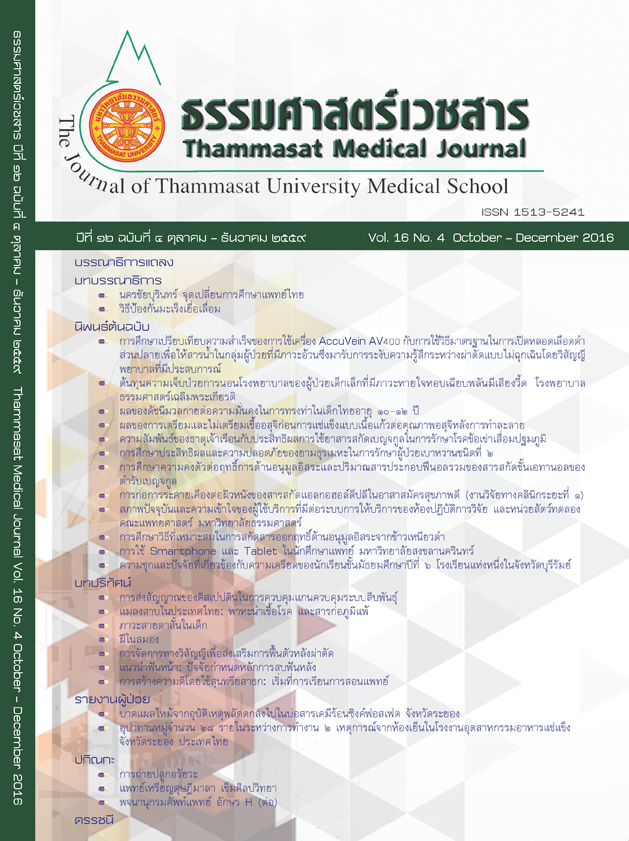Efficacy and safety of Mathurameha for type 2 diabetes mellitus treatment
Keywords:
Efficacy, Safety, Mathurameha, Hypoglycemic effect, Diabetes mellitus type 2, ประสิทธิผล, ความปลอดภัย, มธุรเมหะ, ผลลดระดับน้ำตาลในเลือด, เบาหวานชนิดที่ 2Abstract
Introduction: Diabetes is a non-communicable chronic illness that results in complications and die eventually. Currently, Thai Traditional Medicine, Alternative Medicine and herbs were an alternative in the treatment of chronic disease. Mathurameha is a Thai traditional remedy which has long been used by Ayuravedic (Chevagakomarapat) school more than 30 years. Wangnamyen and Watthana-nakorn hospital Sakaew province used this remedy for diabetic treatment more than 3 years but they did not collect data of efficacy and safety. Thus, the aims of this study were to investigate the glycemic efficacy and safety of Mathurameha (Nirund Pongsoiphet and foundation for the promotion of Thai Traditional Medicine formula) for type 2 diabetes mellitus treatment in Wangnamyen hospital and Watthana-nakorn hospital, Sakaew province.
Method: This retrospective study reviewed from medical record and database of type 2 diabetes patients receiving Mathurameha from June, 2011 to June, 2013. Fasting plasma glucose levels, laboratory data and adverse events were collected from existing records. We classified the subjects to be four treatment groups and analyzed the changes in glycemic parameters by Wilcoxon sign rank test and Pair t-test.
Result: Ultimately, 347 subjects were analyzed in this study, average of age were 48.91 ± 10.22 years, females 286 (82.8%), average BMI (24.98 ± 3.59 kg./m2) and average time period of disease (6.9 ± 4.59 years). Patients who received Mathurameha add on Metformin, Mathurameha add on Metformin and Sulfonylurea were significant to reduced plasma glucose (p = 0.002 and p < 0.001). The fasting plasma glucose of Mathurameha and Mathurameha add on Sulfonylurea were not significant decreased. HbA1c level was not significant to reduce in four groups when compared between before and after taking medicine. Moreover, the LDL-cholesterol level was significantly reduced (p < 0.05) and LDL-cholesterol/HDLcholesterol ratio of before and after taking medicine was not significantly different (p = 0.052). The liver function and renal function were not shown severity of the disease. No severe adverse events were observed.
Discussion and Conclusion: The retrospective study for 3 years usage of Mathurameha suggested that it may be a useful adjunctive treatment to decrease fasting plasma glucose levels in patients with mildly to moderately uncontrolled diabetes. The dose of Mathurameha did minimum and maximum of 350 to 3,500 mg. per day. Mathurameha did not protect cardiovascular disease. In addition, it should have been prospective study by comparing the effectiveness of only Mathurameha with modern medicine.
Key words: Efficacy, Safety, Mathurameha, Hypoglycemic effect, Diabetes mellitus type 2


